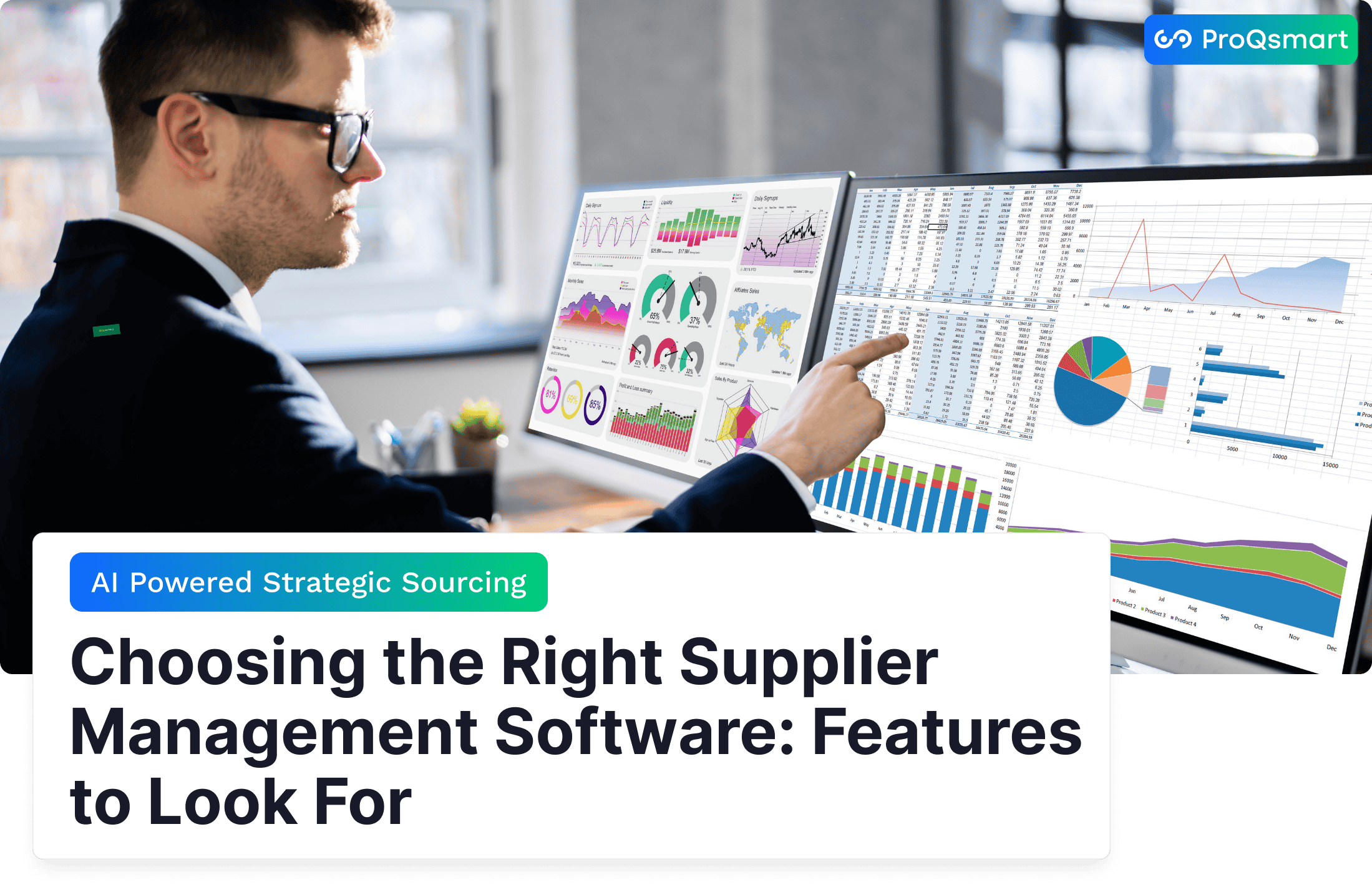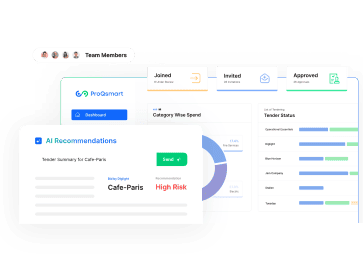Supplier management is a long-term strategic approach to avoiding risks that go beyond just vendor management. This rigorous process maximizes the performance, cost efficiency, and reliability of the entire supply chain. It’s about sourcing from the best suppliers, negotiating the most advantageous contracts, overseeing supplier performance, and minimizing risk to meet your organization’s objectives.
At the same time, careful supplier management ensures a steady supply. At its core, it forges true partnerships that ignite innovation and drive shared success. With the help of tools such as performance scorecards and supplier management portals, companies are able to create more efficient processes and increase visibility.
Adopting a structured supplier management strategy is essential to achieving operational efficiency and sustaining long-term success. This guide dives deep into the smartest, most innovative techniques and best practices for maximizing supplier relationships for the benefit of your organization.
What is Supplier Management?
Supplier management is the organized management of every engagement with, and transaction to and from, outside suppliers. It includes activities like vendor selection, contract negotiation, performance monitoring, and risk management. Supplier management is about creating mutually beneficial and dependable relationships with suppliers.
It’s these powerful partnerships that ultimately allow companies to meet their business objectives in a productive and efficient manner.
Supplier Life Cycle
The supplier life cycle begins with identifying and selecting vendors based on their capabilities, pricing, and alignment with business objectives. Once onboarded, contracts establish clear expectations, terms, and deliverables.
Then continuous performance monitoring begins. Often, regular evaluations are designed to only look at quality, timeliness, or compliance with standards. Digital tools, such as ProQsmart, can automate the entire process from pre-qualification to performance-based review.
This automation adds a level of efficiency and transparency to the entire supplier lifecycle.
Importance of Effective Management
Strong supplier management helps reduce risks—from supply chain disruptions to failure to comply with government regulations. By fostering strong relationships, businesses can ensure timely delivery of quality goods and services, which is vital for smooth operations.
For instance, ProQsmart improves supplier relations by enabling real-time collaboration and transparency, leading to fewer miscommunications and increased trust. This ensures that management of supplier performance is directly linked to the organization’s strategic objectives.
For example, with AI-driven platforms such as ProQsmart, organizations can automate workflows, track supplier compliance status, and stay in budget. This methodical process increases collective engagement.
It fosters a dynamic, evolving supply chain in tune with market fluctuations and better equipped to face unexpected crises.
Challenges in the Traditional Supplier Management Process
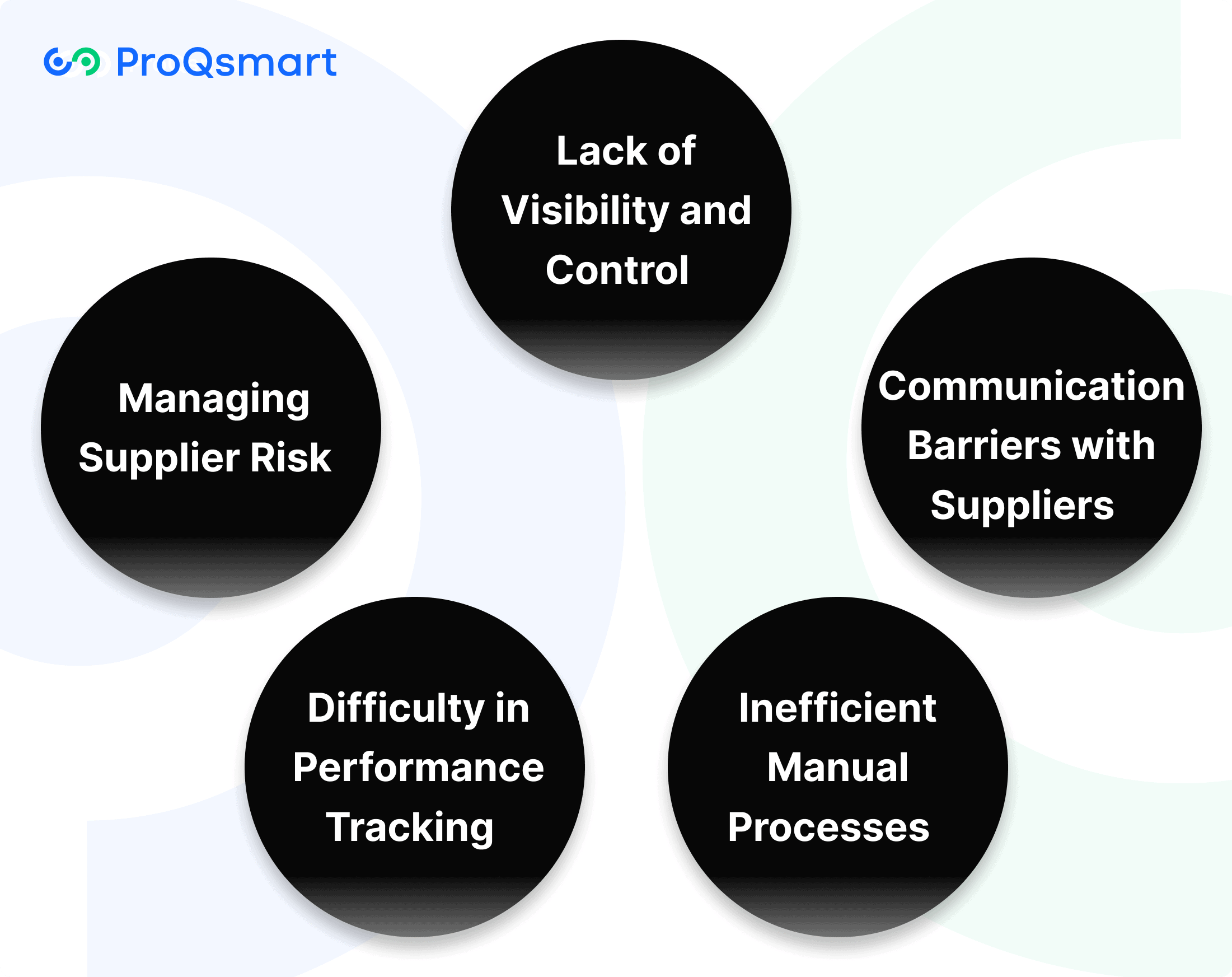
Supplier management faces major challenges that affect both operational efficiency and strategic value, including visibility issues and information overload. These challenges can lead to wasted time and resources, impeding procurement objectives and disrupting supply chains. Developing the best possible supplier relationships is essential for effective supplier relationship management.
1. Lack of Visibility and Control
A lack of real-time visibility into supplier operations hinders decision-making by adding dangerous blind spots to the supply chain. In the absence of centralized data, it’s difficult to know what suppliers are up to which can further exacerbate disruptions and inefficiencies.
Technology solutions, like ProQsmart’s supplier performance monitoring tools, wrap critical oversight around the process to ensure every decision made is data-driven. Centralizing these processes onto a single platform drives transparency across the supply chain, gaining greater control and proactively reducing risks.
2. Communication Barriers with Suppliers
Burdensome and manual email communication threads lead to unclear information, longer response times, and ultimately slowing down overall productivity. Internal and external communication pathways that are clear, transparent, and structured bolster collaborative environments such as ProQsmart and facilitate connections.
These pathways enable real-time knowledge sharing. Ongoing communication and realignment continue to build the supplier relationship, avoiding confusion on what’s needed vs. What’s being delivered.
3. Inefficient Manual Processes
Not only are manual workflows error and delay-prone, they drive up operational costs. Automating redundant tasks with supplier management software mitigates time-wasting processes and improves effectiveness.
Smart Simplified Workflow ProQsmart enhances workflow automation for e-tenders, tender documentation management and more. All of these improvements result in significant time and cost savings that can be measured.
4. Difficulty in Performance Tracking
Measuring supplier performance against established KPIs is vital to success but rarely done uniformly. With automated dashboards and scorecards providing real-time monitoring, like the kind available with ProQsmart, the path to proactive management and accountability is simple.
Consistent performance reviews can address organizational objectives to help ensure suppliers’ goals are in line with your organization’s objectives.
5. Managing Supplier Risk
Supplier risks—such as financial instability and compliance failures—can be mitigated proactively through systematic supplier information management tools. ProQsmart advocates for ongoing monitoring and strategic collaboration to protect your operations from unexpected supply disruptions.
How Supplier Management Software Overcome the Challenges
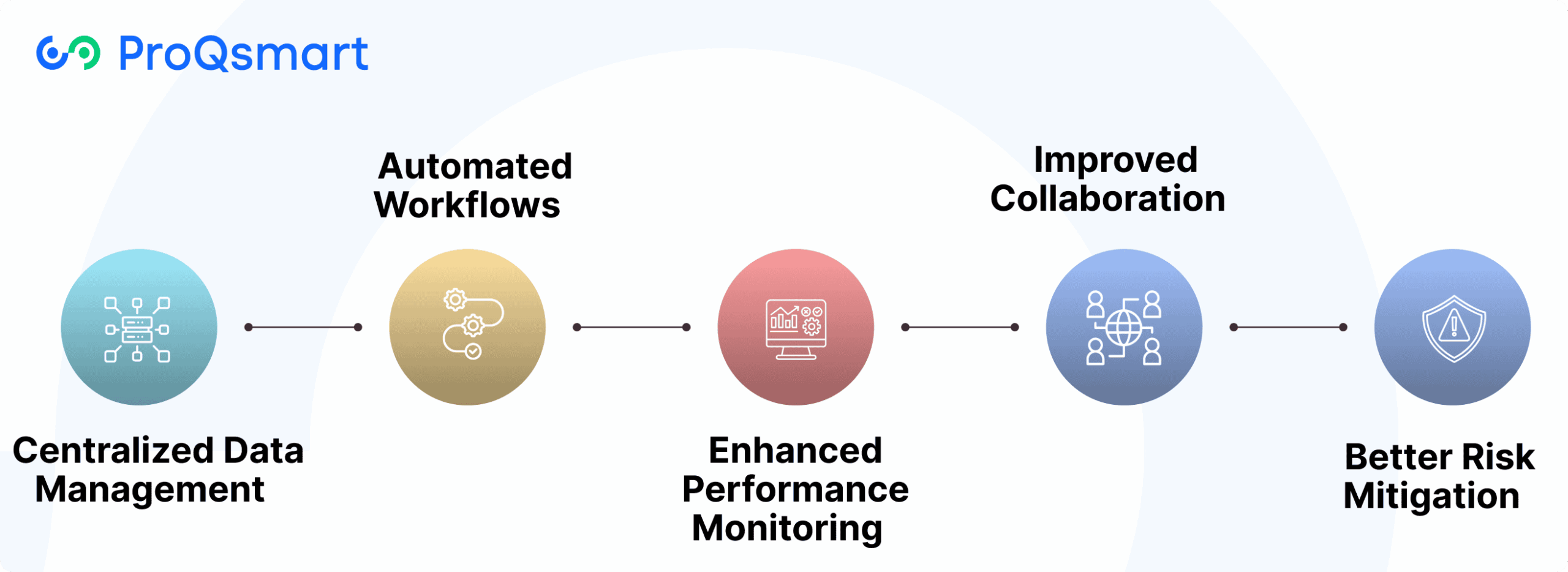
Here’s how supplier management software equips procurement organizations to take a more strategic approach to supplier relationships, overcoming key challenges with the power of technology. By centralizing supplier information, automating workflows, and enhancing collaboration, these platforms streamline operations while improving supply chain resilience.
Centralized Data Management
A centralized repository makes certain that all supplier data, including contracts, certifications, and performance history, are organized in one accessible place. This configuration minimizes errors resulting from scattered data and enables better decision-making.
For instance, a centralized database for tracking supplier performance metrics in one platform helps procurement teams to identify and onboard the most reliable suppliers to the business. ProQsmart’s AI driven platform works best when it comes to the seamless collection and storage of data. This yields real-time visibility into the capabilities of your suppliers.
Automated Workflows
Automation makes onboarding suppliers, managing documents, and pulling reports for compliance much easier. Supplier onboarding, for instance, automating supplier onboarding removes a variety of manual inefficiencies to ensure suppliers are meeting industry and governmental regulations quickly.
With customizable workflows, platforms like ProQsmart save time by eliminating repetitive processes and ensuring accurate data flow, aligning procurement activities with organizational goals.
Enhanced Performance Monitoring
Providing visibility into supplier performance to track compliance in real-time is necessary to holding suppliers accountable to contract terms. Utilizing KPIs and scorecards, teams create a more objective measurement of suppliers to make comparisons.
Analytics tools like ProQsmart furnish smarter insights, fostering a process of ongoing improvement with recurring feedback loops.
Improved Collaboration
Collaboration capabilities enhance supplier relationships through transparent communication and collaborative issue resolution. Collaborative efforts supported by real-time platforms foster a culture of innovation and operational efficiency.
ProQsmart empowers this by easily incorporating collaborative tools that foster transparency and trust among parties.
Better Risk Mitigation
Supplier management software helps you identify vulnerabilities sooner, which proactively protects your reputation. Proactive supply chain strategies, informed by predictive analytics, are key to mitigating and managing disruptions.
By providing AI-driven insights, ProQsmart’s integrated capabilities equip teams to tackle risks proactively—with the ultimate goal of maintaining strong and resilient supplier partnerships.
Key Features to Look in Supplier Management Tools
Comprehensive supplier management tools streamline procurement processes, drive down cycle times and costs, and enable the collaboration needed to support innovative supplier relationships. These tools offer an end-to-end suite of features to manage every stage of supplier lifecycle management.
As with any solution, they promise easy integration, high usability, flexibility, and of course, scalability.
Supplier Onboarding and Offboarding
An effective supplier management tool should make onboarding easy. To make it easy, it should automate and standardize outputs such as document collection, compliance verification, and supplier qualification.
Offboarding must prioritize seamlessness, achieving this with secure data archiving without sacrificing transparency. ProQsmart’s automation capabilities help ensure efficient onboarding workflows and periodic reviews of these procedures keep them up-to-date.
Performance Evaluation Dashboards
Dashboards are key when it comes to getting a visual snapshot of supplier performance metrics such as delivery on time, quality, and cost saving goals. Customizable dashboards help address the different needs of varied stakeholders, improving decision-making and overall tracking.
ProQsmart’s AI-driven supplier performance monitoring delivers real-time insights, keeping your evaluations informed and accurate.
Risk Assessment and Mitigation
Effective supplier management includes identifying and mitigating risks. Regular risk assessments, coupled with AI tools like ProQsmart, automate these processes.
Collaboration with suppliers to address risks proactively strengthens partnerships and ensures operational continuity.
Communication and Collaboration Portals
Centralized dedicated portals enhance supplier relationship management by improving transparency and encouraging real-time collaboration. ProQsmart’s collaboration tools drive faster identification and resolution of issues, fostering strategic supplier relationships and increased innovation.
Contract Management
Effective, transparent contract management processes are essential for compliance and avoiding potential conflicts. ProQsmart’s digitized supplier management tool streamlines contract drafting, monitoring, and auditing, ensuring that contractors align with your organization’s strategic supplier relationships.
Reporting and Analytics
ProQsmart’s advanced reporting tools enhance supplier information management, providing actionable insights to drive improvement in procurement strategies and supplier management processes.
Integration with Other Systems
This is why seamless integration of supplier relationship management tools, such as ProQsmart, with existing systems is crucial for maximizing efficiency and aligning procurement practices with overall business operations.
Customizable Workflows
Flexible, customizable workflows that can scale and adjust with the changing needs of the business are essential for effective supplier relationship management. ProQsmart automates and customizes workflows to help guarantee operational efficiencies and a positive user experience.
How to Select Supplier Management Software
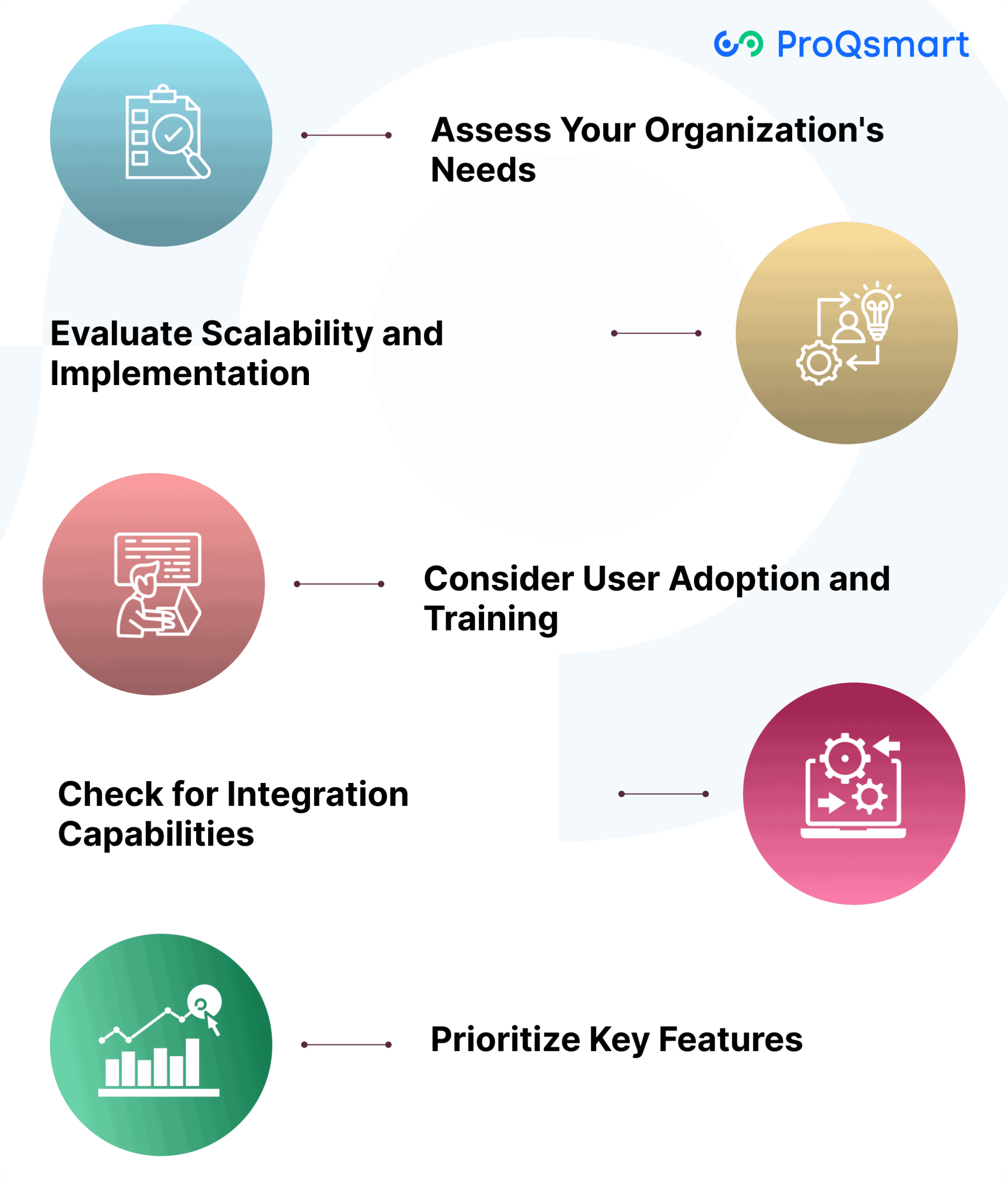
Choosing the right supplier management software is a strategic decision that can enhance your supplier relationship management processes and significantly improve your procurement efficiency. With a methodical approach, you can better position yourself to select the solution that meets your organization’s current needs and future goals.
Assess Your Organization’s Needs
Before exploring software options, it is essential to clarify your organization’s specific requirements. Identify current challenges, such as inefficiencies in supplier tracking or gaps in compliance monitoring, and list features that address these pain points. For example, if your goal is to streamline supplier performance evaluations, prioritize software with robust analytics tools.
Aligning this assessment with your business goals ensures the software adds tangible value.
Evaluate Scalability and Implementation
Look for technology that will scale with your business needs. Furthermore, scalable solutions account for future expansion, both in terms of supplier networks or operational demands.
Evaluate implementation timelines and resources needed. A lengthy process could upend established workflows. Training and ongoing support are just as important.
Vendors that provide extensive onboarding processes and multiple support lines help make the transition smoother. For example, find vendors who have proven experience with quick rollouts in comparable sectors.
Consider User Adoption and Training
The success of any software is mostly determined by users’ adoption. Supplier management solutions that offer intuitive, user-friendly interfaces encourage adopted adoption and engagement, minimizing resistance among internal teams.
As to onboarding, extensive training programs designed around user roles cool the adoption rates. Collecting feedback from first time/scenario users allows you to hone your training approaches and address potential usability issues up-front.
Check for Integration Capabilities
Supplier management software that works well with your current solutions, such as accounting software or ERP systems, makes it easier to share data and ensure accuracy.
Consider vendors in terms of how they will satisfy your current and anticipated integration requirements.
Prioritize Key Features
Write down your required features, such as supplier risk monitoring, compliance management, or reporting functions.
Look for software that allows a high degree of customization, so you can tailor the solution to your specific, dynamic workflows.
Best Practices for Supplier Relationships
Developing and cultivating positive supplier relationships is key to keeping procurement an area of stability and collaboration where all parties can flourish. Effective supplier management processes are not only cost-efficient but also crucial for improving operational efficiency and encouraging innovation. By abiding by these best practices, you can establish supplier relationships that will pay dividends for years to come.
Define Clear Selection Criteria
Having well-defined criteria for how you’ll choose suppliers is pretty important here. Considerations for supply chain reliability, competitive pricing, and ethical business practices are the building blocks of a responsible supplier vetting process.
For instance, looking at a supplier’s history of on-time delivery shows their past reliability when it comes to deadlines. Including cross-functional teams—sourcing, operational, and end-user stakeholders—when selecting suppliers brings diverse perspectives to the table, preventing uninformed decisions or favoritism.
Having these criteria written down contributes to a greater sense of consistency and transparency across all procurement work.
Measure and Improve Performance
Measuring supplier performance on a regular basis against an established set of key performance indicators (KPIs) helps keep everyone honest. As an example, metrics such as on-time delivery rates or product quality can give clear steps moving forward.
Constructive feedback contributes to process improvement. Performance Improvement Plans (PIPS) are proven to manage under-performance. Awarding high performers with accolades or other incentives fosters a collaborative environment and encourages suppliers to aspire to be excellent.
Assess and Manage Risk
Addressing risks from suppliers before they arise, whether that be through financial instability, geopolitical concerns, or more, protects their operations. Creating strong risk management plans, with contingencies, moves projects into a place of preparedness.
Working with suppliers to mitigate risks—for example reworking or sharing the burden of changed deliveries during supply chain shocks—builds both of their resiliences.
Foster Long-Term Relationships
Long-term, collaborative relationships with important suppliers foster goodwill and mutual consideration. When challenges arise, open dialogue and a spirit of joint problem-solving foster creativity and innovation.
Joint initiatives, like co-developing sustainable materials, further strengthen these relationships.
Integrate Sustainability
Having a more effective supplier management practice is good for business, and for the planet. Evaluate sustainability practices, such as creating energy-efficient production processes.
Work together on sustainable sourcing projects to encourage mutual objectives, fitting the mold of winning together in the long run.
Align with Business Strategy
Supplier management should be in service of your larger business goals. ProQsmart’s AI-powered platform makes aligning on these standards easy and automatic by streamlining workflows, tracking supplier performance, and preventing failures in compliance.
Its software encourages communication, facilitates efficiency and improves cost reduction efforts to give you a leg-up in procurement competitiveness.
Conclusion
Healthy supplier management nurtures a deeper root system that makes your initiatives more robust and sustainable. Most importantly, it helps mitigate risks, increase cost certainty and control, and maintain ongoing operations smoothly. Supplier management tools simplify this process by automating workflows and delivering actionable insights. How you select software will largely be dictated by the needs you’ve identified, seek out tools that provide flexibility, visibility, and integration.
In addition to providing immediate wins, strong supplier relationships further provide long-term value and savings. Regular communication, building trust, and establishing goals for and tracking performance help maintain the health of these partnerships. These relationship-based practices will produce long-term, mutually beneficial results for your business and the suppliers you work with.
With ProQsmart, you can streamline processes, enhance transparency, and unlock long-term value from your supplier partnerships. Take the first step toward transforming your procurement strategy and building a more sustainable supply chain. Book a demo with ProQsmart today!

